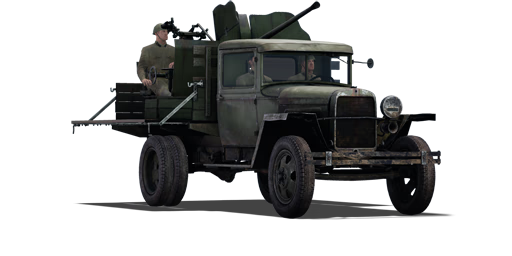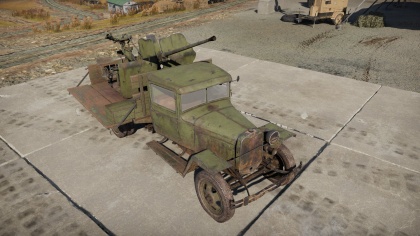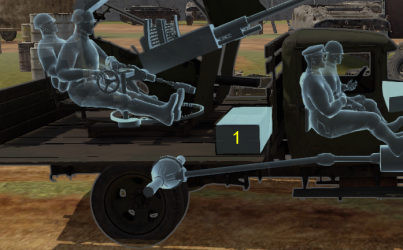GAZ-MM (72-K)
Contents
Description
The GAZ-MM (72-K) (72-K gun mount on a GAZ-MM truck), or as the 72-K GAZ-MM, is a rank II Soviet self-propelled anti-aircraft vehicle
with a battle rating of 2.3 (AB/RB/SB). It was introduced during the Closed Beta Test for Ground Forces before Update 1.41.
The 72-K is an autocannon, bringing a better gun to the playing field. Granted, it is still mounted on an unarmored truck chassis, and the gun shield will only protect from light machine-gun rounds.
The main purpose of this vehicle is to destroy enemy aircraft, mostly it is used to defend friendly tanks from air attack. However, if used correctly, it can damage or even destroy tanks. The fact that the gun has to elevate to fire forward means that one should never face an enemy head-on in this truck. Whilst a player can still shoot aircraft while aiming the turret forwards, against low-flying attackers the task will be more complicated. Whenever possible, one side of this vehicle should have cover - if no targets are to the right of the truck, for instance, it would be senseless to leave the right flank exposed for nothing.
General info
Survivability and armour
Armour type:
- Structural steel
- Wood (Truck bed)
- Rolled homogeneous armour (Gun platform)
| Armour | Front | Sides | Rear | Roof |
|---|---|---|---|---|
| Driver's cabin | 1 mm (2°) | 1 mm (1-6°) | 1 mm (2-3°) | 1 mm |
| Cargo bed | 15 mm (2°) | 15 mm | 15 mm (2°) | 15 mm |
| Gun platform | 7 mm (11-20°) | 7 mm (2°) | N/A | N/A |
Notes:
- Wheels are 2 mm thick while the chassis is 5 mm thick.
- The truck bed is 15 mm of wood, which will probably not offer as much protection as the truck cab.
- The radiator housing is unarmoured.
Mobility
| Mobility characteristic | ||
|---|---|---|
| Weight (tons) | Add-on Armor weight (tons) |
Max speed (km/h) |
| 3.0 | N/A | 49 (AB) |
| 45 (RB/SB) | ||
| Engine power (horsepower) | ||
| Mode | Stock | Upgraded |
| Arcade | 81 | 100 |
| Realistic/Simulator | 50 | 57 |
| Power-to-weight ratio (hp/ton) | ||
| Mode | Stock | Upgraded |
| Arcade | 27.00 | 33.33 |
| Realistic/Simulator | 16.67 | 19.00 |
Armaments
| 25 mm 72-K | |||||
|---|---|---|---|---|---|
| Capacity (Belt capacity) | Fire rate (shots/minute) |
Vertical guidance |
Horizontal guidance |
Stabilizer | |
| 399 (7) | 240 | -10°/+85° | ±180° | N/A | |
| Turret rotation speed (°/s) | |||||
| Mode | Stock | Upgraded | Prior + Full crew | Prior + Expert qualif. | Prior + Ace qualif. |
| Arcade | 20.8 | 28.8 | __.__ | __.__ | __.__ |
| Realistic | 20.8 | 24.5 | __.__ | __.__ | __.__ |
| Reloading rate (seconds) | |||||
| Stock | Prior + Full crew | Prior + Expert qualif. | Prior + Ace qualif. | ||
| 0.3 | __.__ | __.__ | __.__ | ||
Ammunition
| Penetration statistics | ||||||||
|---|---|---|---|---|---|---|---|---|
| Ammunition | Type of warhead |
Penetration in mm @ 90° | ||||||
| 10m | 100m | 500m | 1000m | 1500m | 2000m | |||
| OZR-132 | FI-T* | 3 | 3 | 2 | 2 | 2 | 2 | |
| BR-132 | AP-T | 46 | 43 | 33 | 27 | 23 | 15 | |
| Shell details | ||||||||||
|---|---|---|---|---|---|---|---|---|---|---|
| Ammunition | Type of warhead |
Velocity in m/s |
Projectile Mass in kg |
Fuse delay
in m: |
Fuse sensitivity
in mm: |
Explosive Mass in g (TNT equivalent): |
Normalization At 30° from horizontal: |
Ricochet: | ||
| 0% | 50% | 100% | ||||||||
| OZR-132 | FI-T* | 910 | 0.29 | 0.2 | 0.1 | 13 | +0° | 62° | 69° | 73° |
| BR-132 | AP-T | 900 | 0.28 | N/A | N/A | N/A | -1° | 47° | 60° | 65° |
Belt types
| Belts | Shell composition | Combat usage |
| Default | AP-T, FI-T* (Armour Piercing tracer – Fragmentation Incendiary tracer) shell |
50% of this belt are useless against tanks or planes. However against other SPAA this belt can reliably take out crew, armament, ammo and engine. Having one belt in reserve does not hurt. |
| OZR-132 | FI-T* (Fragmentation Incendiary tracer) shell |
The "explosive" rounds for the gun. This is the best ammo to use against aircraft, but useless against ground vehicles. |
| BR-132 | AP-T (Armour Piercing tracer) shell |
As an armour-piercing round, it is too small to be a significant threat against ground targets but the lightest armoured ones, and has little effect on planes unless you get a good shot on a critical area. Not really a recommended belt to use, but in an emergency it may save your life. |
Ammo racks
| Full ammo |
1st rack empty |
Visual discrepancy |
|---|---|---|
| 57 | 57 | Yes |
Usage in the battles
When it comes to fighting tanks, one should always have a hit-and-run mentality in the 72-K GAZ-MM, since, once discovered, this vehicle is an incredibly easy target. The exception is self-propelled guns with an open top, like the Marder III, the Kugelblitz or the Hellcat. These are very vulnerable to any quick-firing weapon, and as such can be taken down easily if surprised by a volley of 25 mm shells. However, many of these have either fast-firing main guns (in the case of AA vehicles) or machine guns that can devastate the unarmoured 72-K GAZ-MM in seconds.
If you are new to the game or very serious about it you should station this vehicle in a safe area away from the main battle area but close enough to defend your comrades. This vehicle's gun can not aim effectively in the front (as the front of the vehicle stops it.) so you might want to point the back or side to the enemy. Also, you have to consider that the tracers you fire can be easily tracked by enemy tanks so it is wise to change position once in a while. Enemy aircraft will most likely be visible from your spawn. If shot at most players will retreat and call an artillery strike.
Pros and cons
Pros:
- Good shell velocity.
- High rate of fire.
- Very short reload time.
- Decent turret rotation and elevation.
- Good acceleration, that allows it to flank slower tanks/vehicles when encountered at close-quarters.
- AP rounds with enough penetration to kill light and medium tanks that it may encounter.
Cons:
- Highly vulnerable to any HE rounds.
- Cannot shoot straight ahead due to the driver's compartment.
- No armour protection whatsoever.
- Highly vulnerable to artillery fire.
- Vulnerable to machine gun fire, aircraft strafing, and collision damage.
- Poor vehicle stability, very easy to flip upside down when driving in rough terrain.
History
The 25 mm automatic air defence gun M1940 (72-K) (Russian: 25-мм автоматическая зенитная пушка образца 1940 года (72-К)), developed in 1939-1940, was a very common anti-aircraft weapon in the Soviet Union, leading to about 4,860 units produced. It occupies an intermediate position between large-calibre anti-aircraft machine guns of the ANC and the more powerful 37mm anti-aircraft guns of the 61-K, this vehicle was designed for an Infantry Regiment level air defence. The gun was created at the beginning of 1940 at 8th Kalinin Artillery Plant under the guidance of its Chief Designer Mikhail Loginov.
To increase mobility in the second half of 1941, the 72-K anti-aircraft machine was installed on the chassis of the GAZ-MM. GAZ–MM is a truck with a maximum usable weight of 1.5 ton. It was produced at the end of the 1930s and at the first part of the 1940s by GAZ in the Soviet Union. It is a simplified version of the Ford Model AA’s Soviet licence version. At the beginning of World War II, more than 150,000 were in use by the Red Army. Tests showed the success of the design and the gun mount so it was put into serial production, called the GAZ MM (72-K). However, only 200 units were produced, as the manufacturer’s factory, Kolomna Locomotive Works, was evacuated. Subsequently, the GAZ MM (72-K) was no longer produced.
In-game description
Before the Great Patriotic War began, the question of creating so-called anti-aircraft tanks was under consideration. Among projects in an early stage of development was an anti-aircraft tank with a turret-mounted 25 mm 72-K anti-aircraft gun placed on a T-50 light tank. Due to the beginning of the war, all work on this vehicle, dubbed the T-50-2, was halted.
In the second half of 1941, tests were conducted on the 25 mm 72-K Mod. 1940 cannon mounted on the back of a 4 × 2 GAZ-MM truck made by the Gorky automobile factory. The tests were successful, and this improvised SPAAG was put into mass production at the Kolomna Locomotive Works. Additional motivation to produce these vehicles came from the fact that installing 72-K cannons in these trucks did not require carriages, which were seriously problematic to manufacture. Due to the evacuation of the facility they were built in, mass production of the SPAAG ceased in December 1941 after around 200 were produced.
The anti-aircraft vehicle's crew consisted of 6 people. The primary task of the new SPAAG was to fire on air targets at a range of up to 2.4 km and a height of up to 2 km. If necessary, the cannon could also be used successfully to fire on ground targets, including light tanks and armoured vehicles.
The vehicle's advantages lay in its high mobility and ease of manufacturing. The SPAAG's disadvantages included insufficient manoeuvrability, particularly off-road, and its lack of armour plating or any kind of armour protection for the crew.
Media
Skins and camouflages for the GAZ truck from live.warthunder.com
Read also
Links to the articles on the War Thunder Wiki that you think will be useful for the reader, for example,
- reference to the series of the vehicles;
- links to approximate analogues of other nations and research trees.
ETC.
Sources
Paste links to sources and external resources, such as:
- topic on the official game forum;
- other literature.
| USSR anti-aircraft vehicles | |
|---|---|
| GAZ-AAA | GAZ-AAA (4M) · GAZ-AAA (DShK) |
| BTR-152 | BTR-152A · BTR-152D |
| Wheeled/Half-tracked | GAZ-MM (72-K) · ZiS-12 (94-KM) · ZiS-43 |
| Radar SPAAG | ZSU-23-4 · ZSU-37-2 |
| SAM | ZSU-23-4M4 · Strela-10M2 · 2S6 · Pantsir-S1 |
| Other | ZSU-23-4M2 · ZUT-37 · ZSU-37 · BTR-ZD · ZSU-57-2 |
| Czechoslovakia | M53/59 |
| North Vietnam | ▂Phòng không T-34 |






